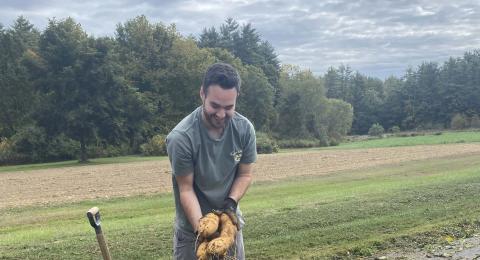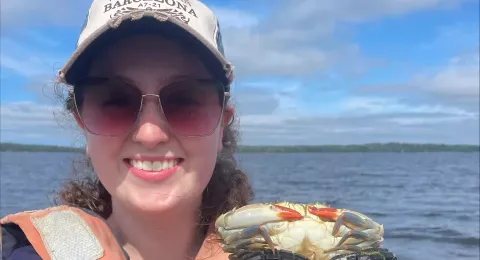Research
Neural oscillations in visual and auditory perception
As part of the NOVA lab, Sierra will be using neurophysiology to explore aspects of visual and auditory perception.
Learn More
Ocean Change and Species Interaction
Sophie's research topic is yet to be chosen, she plans to research how anthropogenic effects will alter organism physiology, energy allocation, and ecological dynamics in rocky intertidal ecosystems.
Learn More
The cumulative impact of anthropogenic stressors on larval recruitment of blue mussels
Abigail's research investigates the cumulative impact of water temperature and anthropogenic noise on the settlement behavior of larval blue mussels (Mytilus edulis).
Learn More
Effects of environmental stressors on Eastern oysters and aquaculture
Maggie's research focuses on evaluating the effect of environmental stressors on Eastern oysters and potential impacts on aquaculture
Learn More
Antibiotic Resistance in New Hampshire Watersheds
Natalie's research focuses on analyzing how antibiotic resistant genes (ARGs) vary both specially and temporally in the Great Bay Estuary, as well as examining their presence in local oyster populations.
Learn More
The effects of experience on the brain and behavior
Dylan's research combines behavioral, immunohistochemical, and other analyses with rodent models to examine the impact of various experiences, such as aging, exercise, and stress, on cognition and neural architecture..
Learn More
Predicting marine heatwaves and effects on aquaculture
Kaila uses statistical and mechanistic modeling techniques to predict extreme temperature events and forecast best practices for ecosystem management.
Learn More
Non-traditional student and BIO-SENS researcher earns national award for electrochemical biosensing work.
Ryan Brown, a former science teacher and current UNH neuroscience student, was recognized at Pittcon 2025 for his research on electrochemical biosensors.
Learn More
Contributing to Water Quality Analysis at UNH
Haley Sanborn is an intern and laboratory technician at the Water Quality Analysis Lab (WQAL) at the University of New Hampshire. She started her role in June 2024 and has been deeply involved in significant environmental research since.
Learn More
Pivotal Undergrad Research Experience Leads to Pursuit of Doctorate at Dartmouth
Allison Carl graduated in 2024 with a degree in biochemistry, molecular and cellular biology. She is now pursuing her doctorate in molecular and cellular biology at Dartmouth College.
Learn More
At work on a variety of agricultural research projects that benefit local and regional farmers
Braden Foulks ’25 has been working with Professor Becky Sideman and Professor Iago Hale on their respective research.
Learn More
Working to improve the ecosystem of Great Bay
Caylin Grove is a genetics: genomics major from Hollis, New Hampshire, who is researching the presence of two diseases that affect oysters in Great Bay.
Learn More











